Business Report: Revenue Management, HR, and Legal Aspects of Tourism
VerifiedAdded on 2020/10/22
|12
|3541
|368
Report
AI Summary
This report examines key aspects of the travel and tourism industry, focusing on revenue management, human resources, and legal considerations. It begins by outlining the principles of revenue management, including market segmentation, forecasting, and pricing strategies, and then explores the application of revenue management tools such as property management systems, booking engines, channel managers, and rate shoppers, particularly within the cruise line industry. The report then delves into the HR lifecycle, using Carnival Corporation & PLC as a case study, covering attraction, recruitment, onboarding, enablement, development, retention, and separation stages for a Food & Beverage Manager role. A performance management plan is also presented to address employee performance issues. Finally, the report discusses relevant legislations, including the Tourism Act, transport acts, and package travel regulations, along with the impact of company, employment, and contract law on business decision-making within the industry. The report also covers different types of financial statements, the importance of budgets for controlling business performance, and identifying variances.
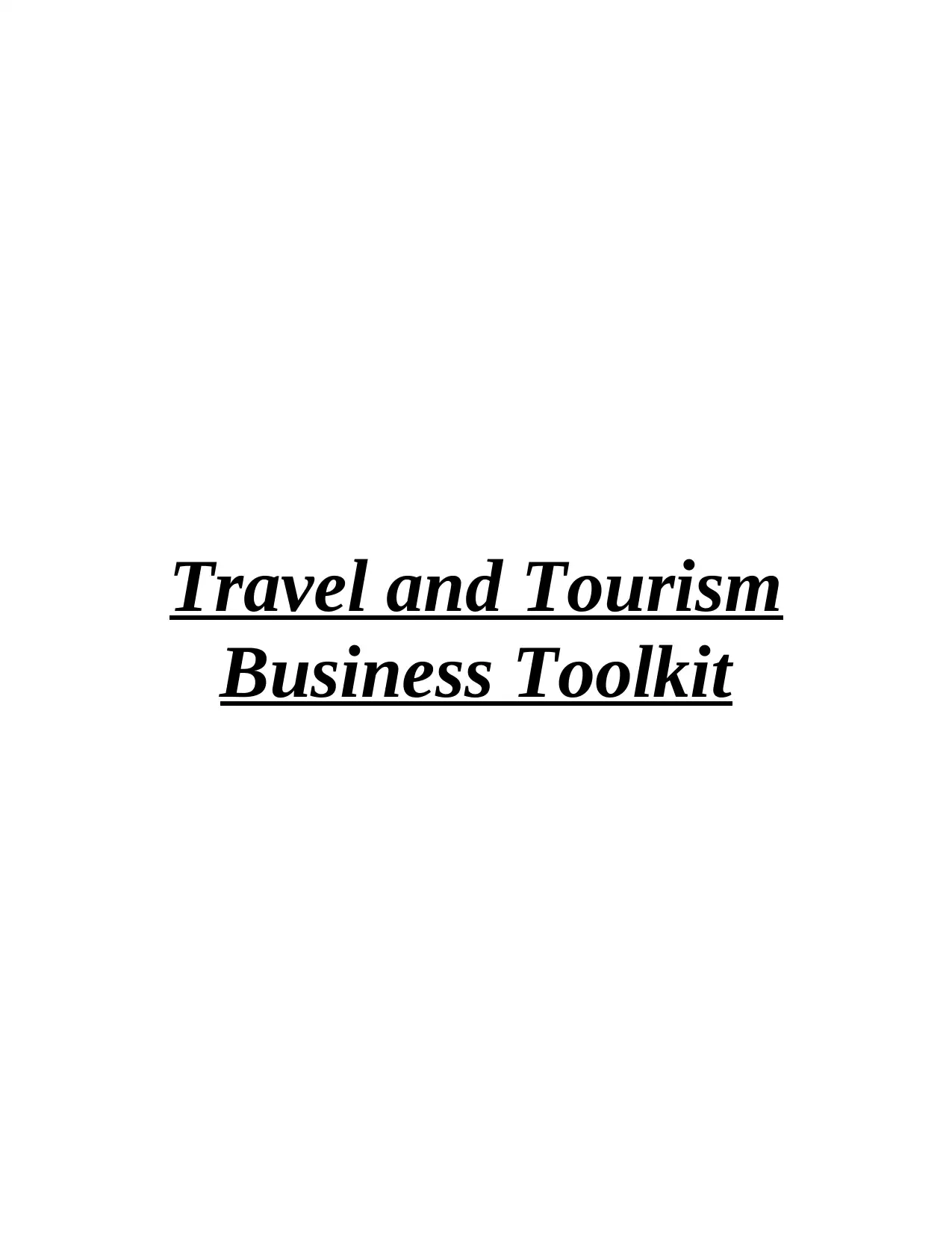
Travel and Tourism
Business Toolkit
Business Toolkit
Paraphrase This Document
Need a fresh take? Get an instant paraphrase of this document with our AI Paraphraser
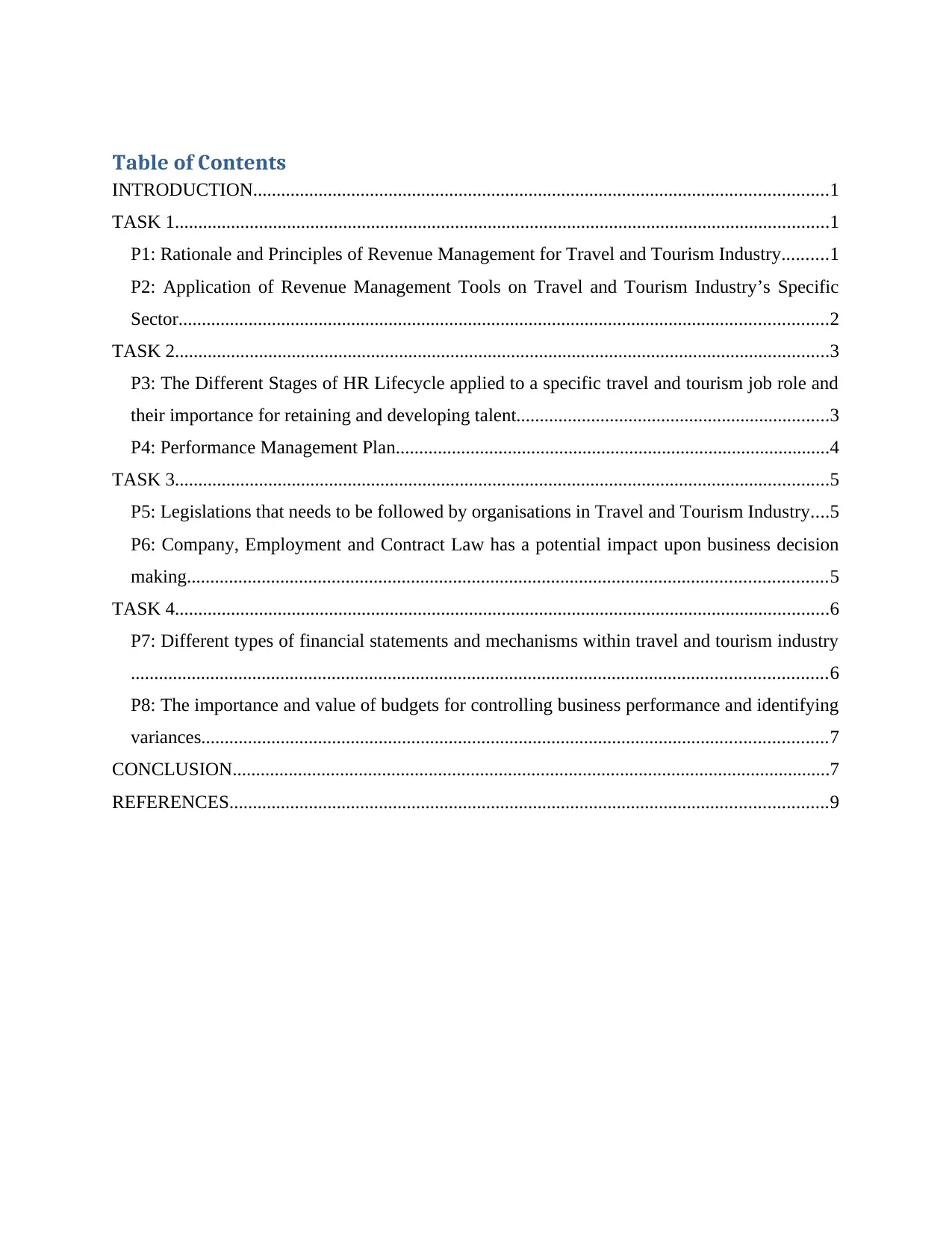
Table of Contents
INTRODUCTION...........................................................................................................................1
TASK 1............................................................................................................................................1
P1: Rationale and Principles of Revenue Management for Travel and Tourism Industry..........1
P2: Application of Revenue Management Tools on Travel and Tourism Industry’s Specific
Sector...........................................................................................................................................2
TASK 2............................................................................................................................................3
P3: The Different Stages of HR Lifecycle applied to a specific travel and tourism job role and
their importance for retaining and developing talent...................................................................3
P4: Performance Management Plan.............................................................................................4
TASK 3............................................................................................................................................5
P5: Legislations that needs to be followed by organisations in Travel and Tourism Industry....5
P6: Company, Employment and Contract Law has a potential impact upon business decision
making.........................................................................................................................................5
TASK 4............................................................................................................................................6
P7: Different types of financial statements and mechanisms within travel and tourism industry
.....................................................................................................................................................6
P8: The importance and value of budgets for controlling business performance and identifying
variances......................................................................................................................................7
CONCLUSION................................................................................................................................7
REFERENCES................................................................................................................................9
INTRODUCTION...........................................................................................................................1
TASK 1............................................................................................................................................1
P1: Rationale and Principles of Revenue Management for Travel and Tourism Industry..........1
P2: Application of Revenue Management Tools on Travel and Tourism Industry’s Specific
Sector...........................................................................................................................................2
TASK 2............................................................................................................................................3
P3: The Different Stages of HR Lifecycle applied to a specific travel and tourism job role and
their importance for retaining and developing talent...................................................................3
P4: Performance Management Plan.............................................................................................4
TASK 3............................................................................................................................................5
P5: Legislations that needs to be followed by organisations in Travel and Tourism Industry....5
P6: Company, Employment and Contract Law has a potential impact upon business decision
making.........................................................................................................................................5
TASK 4............................................................................................................................................6
P7: Different types of financial statements and mechanisms within travel and tourism industry
.....................................................................................................................................................6
P8: The importance and value of budgets for controlling business performance and identifying
variances......................................................................................................................................7
CONCLUSION................................................................................................................................7
REFERENCES................................................................................................................................9

⊘ This is a preview!⊘
Do you want full access?
Subscribe today to unlock all pages.

Trusted by 1+ million students worldwide
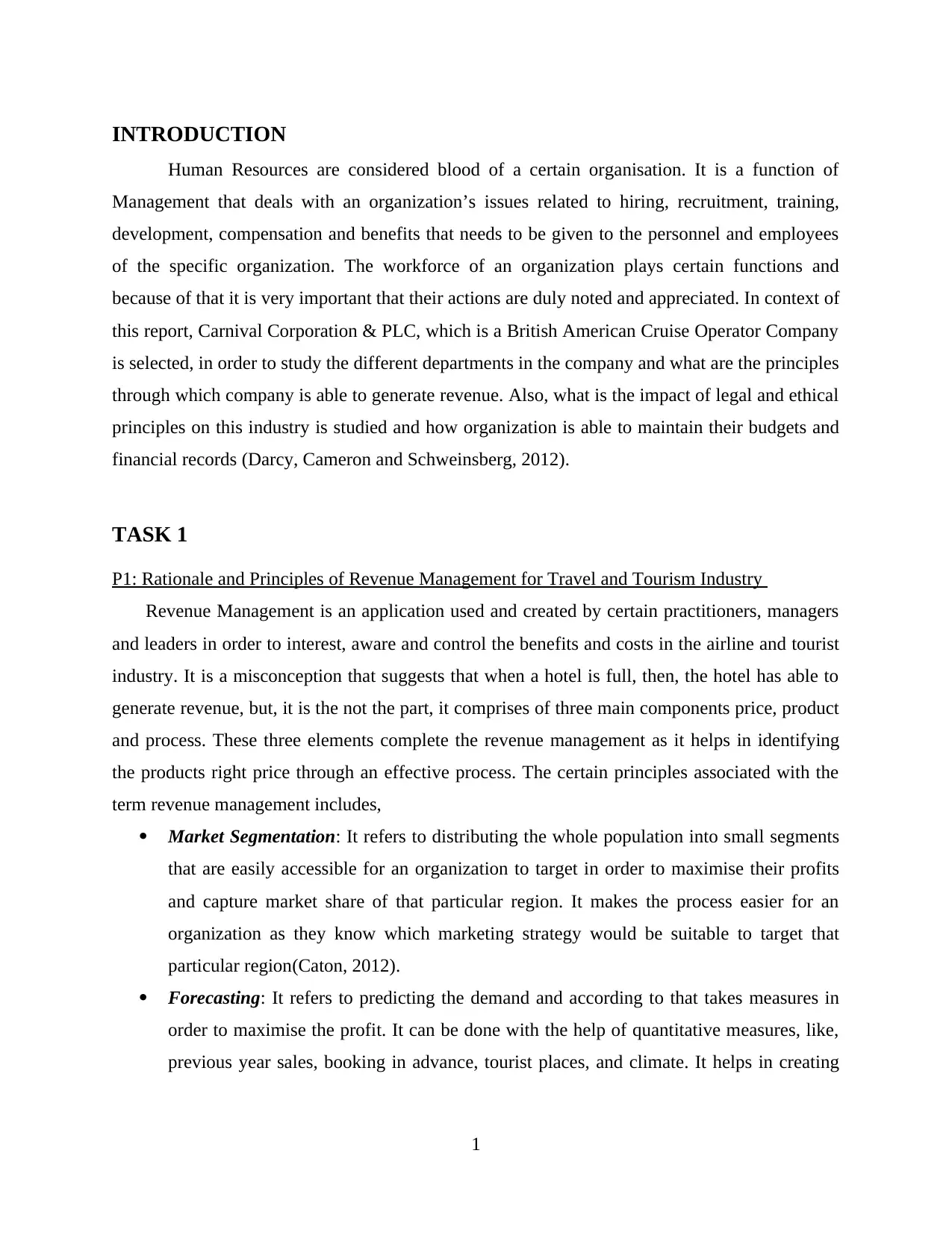
INTRODUCTION
Human Resources are considered blood of a certain organisation. It is a function of
Management that deals with an organization’s issues related to hiring, recruitment, training,
development, compensation and benefits that needs to be given to the personnel and employees
of the specific organization. The workforce of an organization plays certain functions and
because of that it is very important that their actions are duly noted and appreciated. In context of
this report, Carnival Corporation & PLC, which is a British American Cruise Operator Company
is selected, in order to study the different departments in the company and what are the principles
through which company is able to generate revenue. Also, what is the impact of legal and ethical
principles on this industry is studied and how organization is able to maintain their budgets and
financial records (Darcy, Cameron and Schweinsberg, 2012).
TASK 1
P1: Rationale and Principles of Revenue Management for Travel and Tourism Industry
Revenue Management is an application used and created by certain practitioners, managers
and leaders in order to interest, aware and control the benefits and costs in the airline and tourist
industry. It is a misconception that suggests that when a hotel is full, then, the hotel has able to
generate revenue, but, it is the not the part, it comprises of three main components price, product
and process. These three elements complete the revenue management as it helps in identifying
the products right price through an effective process. The certain principles associated with the
term revenue management includes,
Market Segmentation: It refers to distributing the whole population into small segments
that are easily accessible for an organization to target in order to maximise their profits
and capture market share of that particular region. It makes the process easier for an
organization as they know which marketing strategy would be suitable to target that
particular region(Caton, 2012).
Forecasting: It refers to predicting the demand and according to that takes measures in
order to maximise the profit. It can be done with the help of quantitative measures, like,
previous year sales, booking in advance, tourist places, and climate. It helps in creating
1
Human Resources are considered blood of a certain organisation. It is a function of
Management that deals with an organization’s issues related to hiring, recruitment, training,
development, compensation and benefits that needs to be given to the personnel and employees
of the specific organization. The workforce of an organization plays certain functions and
because of that it is very important that their actions are duly noted and appreciated. In context of
this report, Carnival Corporation & PLC, which is a British American Cruise Operator Company
is selected, in order to study the different departments in the company and what are the principles
through which company is able to generate revenue. Also, what is the impact of legal and ethical
principles on this industry is studied and how organization is able to maintain their budgets and
financial records (Darcy, Cameron and Schweinsberg, 2012).
TASK 1
P1: Rationale and Principles of Revenue Management for Travel and Tourism Industry
Revenue Management is an application used and created by certain practitioners, managers
and leaders in order to interest, aware and control the benefits and costs in the airline and tourist
industry. It is a misconception that suggests that when a hotel is full, then, the hotel has able to
generate revenue, but, it is the not the part, it comprises of three main components price, product
and process. These three elements complete the revenue management as it helps in identifying
the products right price through an effective process. The certain principles associated with the
term revenue management includes,
Market Segmentation: It refers to distributing the whole population into small segments
that are easily accessible for an organization to target in order to maximise their profits
and capture market share of that particular region. It makes the process easier for an
organization as they know which marketing strategy would be suitable to target that
particular region(Caton, 2012).
Forecasting: It refers to predicting the demand and according to that takes measures in
order to maximise the profit. It can be done with the help of quantitative measures, like,
previous year sales, booking in advance, tourist places, and climate. It helps in creating
1
Paraphrase This Document
Need a fresh take? Get an instant paraphrase of this document with our AI Paraphraser
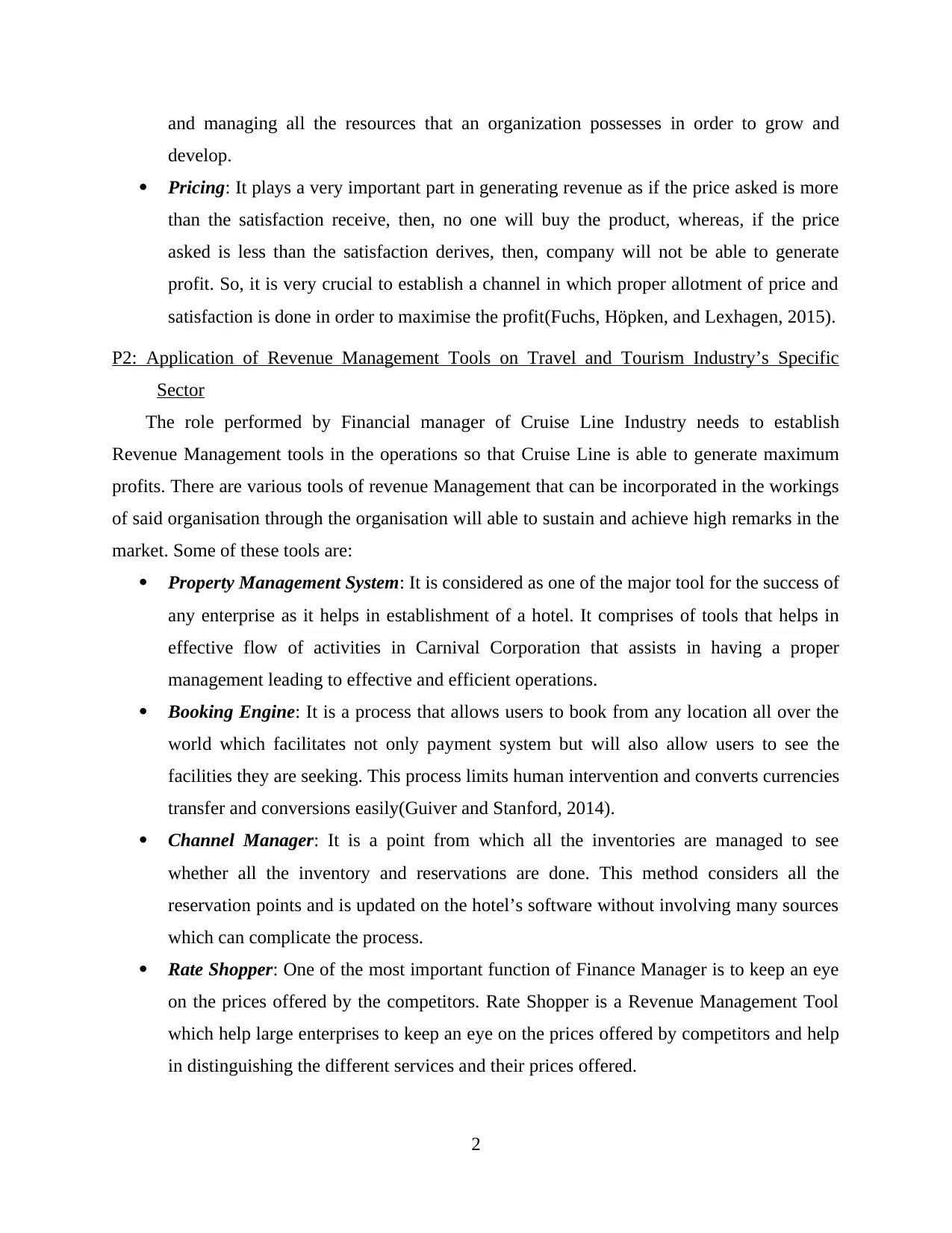
and managing all the resources that an organization possesses in order to grow and
develop.
Pricing: It plays a very important part in generating revenue as if the price asked is more
than the satisfaction receive, then, no one will buy the product, whereas, if the price
asked is less than the satisfaction derives, then, company will not be able to generate
profit. So, it is very crucial to establish a channel in which proper allotment of price and
satisfaction is done in order to maximise the profit(Fuchs, Höpken, and Lexhagen, 2015).
P2: Application of Revenue Management Tools on Travel and Tourism Industry’s Specific
Sector
The role performed by Financial manager of Cruise Line Industry needs to establish
Revenue Management tools in the operations so that Cruise Line is able to generate maximum
profits. There are various tools of revenue Management that can be incorporated in the workings
of said organisation through the organisation will able to sustain and achieve high remarks in the
market. Some of these tools are:
Property Management System: It is considered as one of the major tool for the success of
any enterprise as it helps in establishment of a hotel. It comprises of tools that helps in
effective flow of activities in Carnival Corporation that assists in having a proper
management leading to effective and efficient operations.
Booking Engine: It is a process that allows users to book from any location all over the
world which facilitates not only payment system but will also allow users to see the
facilities they are seeking. This process limits human intervention and converts currencies
transfer and conversions easily(Guiver and Stanford, 2014).
Channel Manager: It is a point from which all the inventories are managed to see
whether all the inventory and reservations are done. This method considers all the
reservation points and is updated on the hotel’s software without involving many sources
which can complicate the process.
Rate Shopper: One of the most important function of Finance Manager is to keep an eye
on the prices offered by the competitors. Rate Shopper is a Revenue Management Tool
which help large enterprises to keep an eye on the prices offered by competitors and help
in distinguishing the different services and their prices offered.
2
develop.
Pricing: It plays a very important part in generating revenue as if the price asked is more
than the satisfaction receive, then, no one will buy the product, whereas, if the price
asked is less than the satisfaction derives, then, company will not be able to generate
profit. So, it is very crucial to establish a channel in which proper allotment of price and
satisfaction is done in order to maximise the profit(Fuchs, Höpken, and Lexhagen, 2015).
P2: Application of Revenue Management Tools on Travel and Tourism Industry’s Specific
Sector
The role performed by Financial manager of Cruise Line Industry needs to establish
Revenue Management tools in the operations so that Cruise Line is able to generate maximum
profits. There are various tools of revenue Management that can be incorporated in the workings
of said organisation through the organisation will able to sustain and achieve high remarks in the
market. Some of these tools are:
Property Management System: It is considered as one of the major tool for the success of
any enterprise as it helps in establishment of a hotel. It comprises of tools that helps in
effective flow of activities in Carnival Corporation that assists in having a proper
management leading to effective and efficient operations.
Booking Engine: It is a process that allows users to book from any location all over the
world which facilitates not only payment system but will also allow users to see the
facilities they are seeking. This process limits human intervention and converts currencies
transfer and conversions easily(Guiver and Stanford, 2014).
Channel Manager: It is a point from which all the inventories are managed to see
whether all the inventory and reservations are done. This method considers all the
reservation points and is updated on the hotel’s software without involving many sources
which can complicate the process.
Rate Shopper: One of the most important function of Finance Manager is to keep an eye
on the prices offered by the competitors. Rate Shopper is a Revenue Management Tool
which help large enterprises to keep an eye on the prices offered by competitors and help
in distinguishing the different services and their prices offered.
2
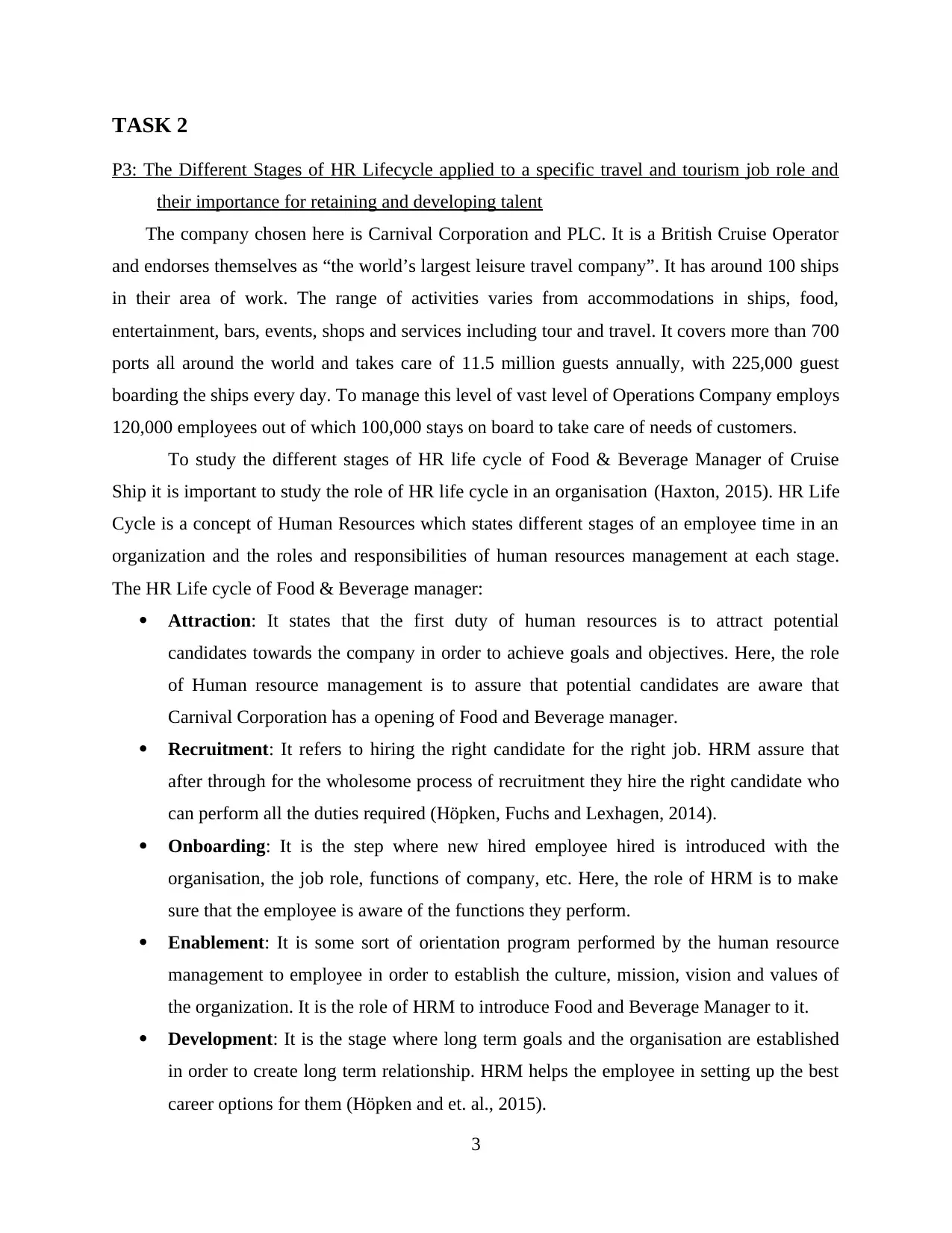
TASK 2
P3: The Different Stages of HR Lifecycle applied to a specific travel and tourism job role and
their importance for retaining and developing talent
The company chosen here is Carnival Corporation and PLC. It is a British Cruise Operator
and endorses themselves as “the world’s largest leisure travel company”. It has around 100 ships
in their area of work. The range of activities varies from accommodations in ships, food,
entertainment, bars, events, shops and services including tour and travel. It covers more than 700
ports all around the world and takes care of 11.5 million guests annually, with 225,000 guest
boarding the ships every day. To manage this level of vast level of Operations Company employs
120,000 employees out of which 100,000 stays on board to take care of needs of customers.
To study the different stages of HR life cycle of Food & Beverage Manager of Cruise
Ship it is important to study the role of HR life cycle in an organisation (Haxton, 2015). HR Life
Cycle is a concept of Human Resources which states different stages of an employee time in an
organization and the roles and responsibilities of human resources management at each stage.
The HR Life cycle of Food & Beverage manager:
Attraction: It states that the first duty of human resources is to attract potential
candidates towards the company in order to achieve goals and objectives. Here, the role
of Human resource management is to assure that potential candidates are aware that
Carnival Corporation has a opening of Food and Beverage manager.
Recruitment: It refers to hiring the right candidate for the right job. HRM assure that
after through for the wholesome process of recruitment they hire the right candidate who
can perform all the duties required (Höpken, Fuchs and Lexhagen, 2014).
Onboarding: It is the step where new hired employee hired is introduced with the
organisation, the job role, functions of company, etc. Here, the role of HRM is to make
sure that the employee is aware of the functions they perform.
Enablement: It is some sort of orientation program performed by the human resource
management to employee in order to establish the culture, mission, vision and values of
the organization. It is the role of HRM to introduce Food and Beverage Manager to it.
Development: It is the stage where long term goals and the organisation are established
in order to create long term relationship. HRM helps the employee in setting up the best
career options for them (Höpken and et. al., 2015).
3
P3: The Different Stages of HR Lifecycle applied to a specific travel and tourism job role and
their importance for retaining and developing talent
The company chosen here is Carnival Corporation and PLC. It is a British Cruise Operator
and endorses themselves as “the world’s largest leisure travel company”. It has around 100 ships
in their area of work. The range of activities varies from accommodations in ships, food,
entertainment, bars, events, shops and services including tour and travel. It covers more than 700
ports all around the world and takes care of 11.5 million guests annually, with 225,000 guest
boarding the ships every day. To manage this level of vast level of Operations Company employs
120,000 employees out of which 100,000 stays on board to take care of needs of customers.
To study the different stages of HR life cycle of Food & Beverage Manager of Cruise
Ship it is important to study the role of HR life cycle in an organisation (Haxton, 2015). HR Life
Cycle is a concept of Human Resources which states different stages of an employee time in an
organization and the roles and responsibilities of human resources management at each stage.
The HR Life cycle of Food & Beverage manager:
Attraction: It states that the first duty of human resources is to attract potential
candidates towards the company in order to achieve goals and objectives. Here, the role
of Human resource management is to assure that potential candidates are aware that
Carnival Corporation has a opening of Food and Beverage manager.
Recruitment: It refers to hiring the right candidate for the right job. HRM assure that
after through for the wholesome process of recruitment they hire the right candidate who
can perform all the duties required (Höpken, Fuchs and Lexhagen, 2014).
Onboarding: It is the step where new hired employee hired is introduced with the
organisation, the job role, functions of company, etc. Here, the role of HRM is to make
sure that the employee is aware of the functions they perform.
Enablement: It is some sort of orientation program performed by the human resource
management to employee in order to establish the culture, mission, vision and values of
the organization. It is the role of HRM to introduce Food and Beverage Manager to it.
Development: It is the stage where long term goals and the organisation are established
in order to create long term relationship. HRM helps the employee in setting up the best
career options for them (Höpken and et. al., 2015).
3
⊘ This is a preview!⊘
Do you want full access?
Subscribe today to unlock all pages.

Trusted by 1+ million students worldwide
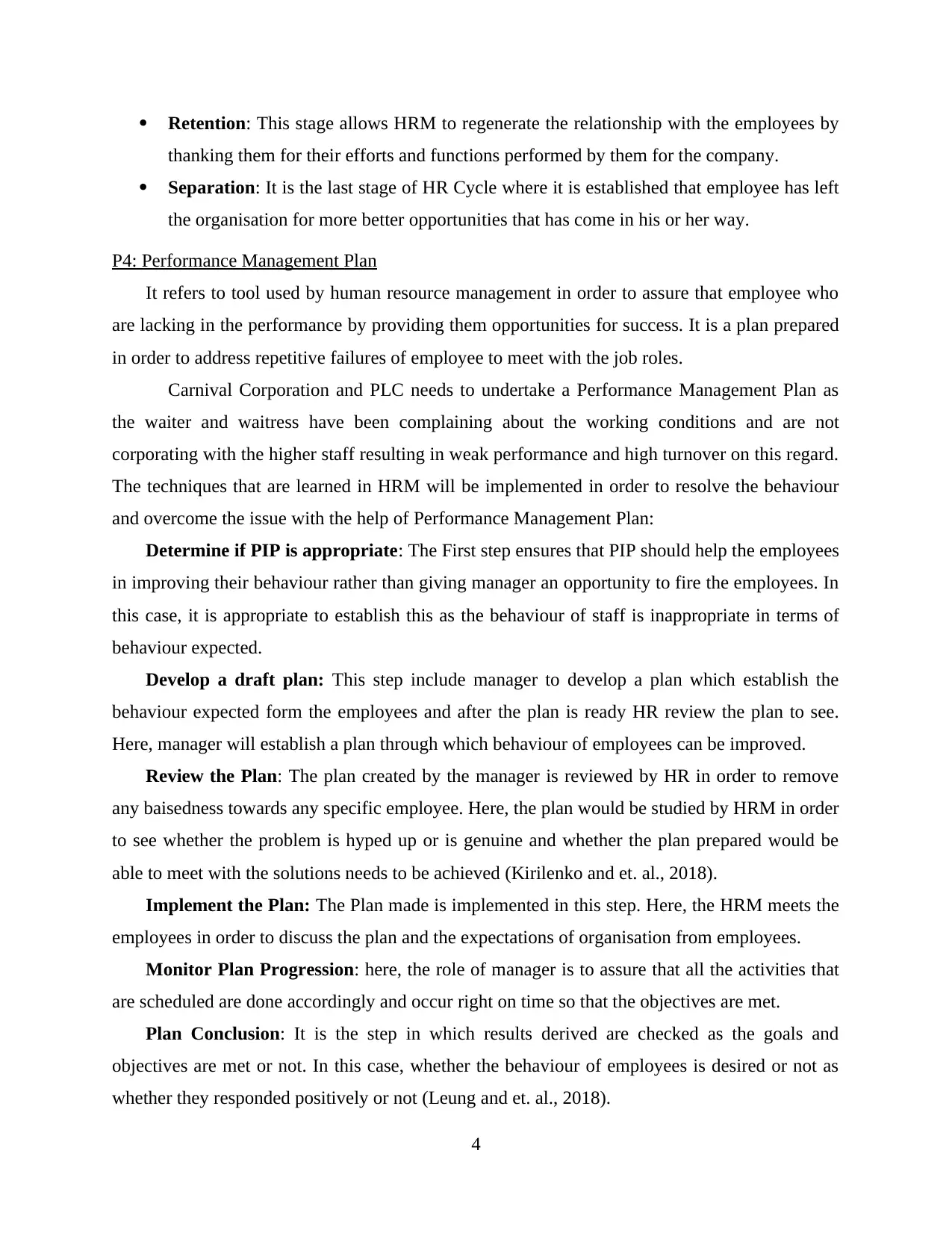
Retention: This stage allows HRM to regenerate the relationship with the employees by
thanking them for their efforts and functions performed by them for the company.
Separation: It is the last stage of HR Cycle where it is established that employee has left
the organisation for more better opportunities that has come in his or her way.
P4: Performance Management Plan
It refers to tool used by human resource management in order to assure that employee who
are lacking in the performance by providing them opportunities for success. It is a plan prepared
in order to address repetitive failures of employee to meet with the job roles.
Carnival Corporation and PLC needs to undertake a Performance Management Plan as
the waiter and waitress have been complaining about the working conditions and are not
corporating with the higher staff resulting in weak performance and high turnover on this regard.
The techniques that are learned in HRM will be implemented in order to resolve the behaviour
and overcome the issue with the help of Performance Management Plan:
Determine if PIP is appropriate: The First step ensures that PIP should help the employees
in improving their behaviour rather than giving manager an opportunity to fire the employees. In
this case, it is appropriate to establish this as the behaviour of staff is inappropriate in terms of
behaviour expected.
Develop a draft plan: This step include manager to develop a plan which establish the
behaviour expected form the employees and after the plan is ready HR review the plan to see.
Here, manager will establish a plan through which behaviour of employees can be improved.
Review the Plan: The plan created by the manager is reviewed by HR in order to remove
any baisedness towards any specific employee. Here, the plan would be studied by HRM in order
to see whether the problem is hyped up or is genuine and whether the plan prepared would be
able to meet with the solutions needs to be achieved (Kirilenko and et. al., 2018).
Implement the Plan: The Plan made is implemented in this step. Here, the HRM meets the
employees in order to discuss the plan and the expectations of organisation from employees.
Monitor Plan Progression: here, the role of manager is to assure that all the activities that
are scheduled are done accordingly and occur right on time so that the objectives are met.
Plan Conclusion: It is the step in which results derived are checked as the goals and
objectives are met or not. In this case, whether the behaviour of employees is desired or not as
whether they responded positively or not (Leung and et. al., 2018).
4
thanking them for their efforts and functions performed by them for the company.
Separation: It is the last stage of HR Cycle where it is established that employee has left
the organisation for more better opportunities that has come in his or her way.
P4: Performance Management Plan
It refers to tool used by human resource management in order to assure that employee who
are lacking in the performance by providing them opportunities for success. It is a plan prepared
in order to address repetitive failures of employee to meet with the job roles.
Carnival Corporation and PLC needs to undertake a Performance Management Plan as
the waiter and waitress have been complaining about the working conditions and are not
corporating with the higher staff resulting in weak performance and high turnover on this regard.
The techniques that are learned in HRM will be implemented in order to resolve the behaviour
and overcome the issue with the help of Performance Management Plan:
Determine if PIP is appropriate: The First step ensures that PIP should help the employees
in improving their behaviour rather than giving manager an opportunity to fire the employees. In
this case, it is appropriate to establish this as the behaviour of staff is inappropriate in terms of
behaviour expected.
Develop a draft plan: This step include manager to develop a plan which establish the
behaviour expected form the employees and after the plan is ready HR review the plan to see.
Here, manager will establish a plan through which behaviour of employees can be improved.
Review the Plan: The plan created by the manager is reviewed by HR in order to remove
any baisedness towards any specific employee. Here, the plan would be studied by HRM in order
to see whether the problem is hyped up or is genuine and whether the plan prepared would be
able to meet with the solutions needs to be achieved (Kirilenko and et. al., 2018).
Implement the Plan: The Plan made is implemented in this step. Here, the HRM meets the
employees in order to discuss the plan and the expectations of organisation from employees.
Monitor Plan Progression: here, the role of manager is to assure that all the activities that
are scheduled are done accordingly and occur right on time so that the objectives are met.
Plan Conclusion: It is the step in which results derived are checked as the goals and
objectives are met or not. In this case, whether the behaviour of employees is desired or not as
whether they responded positively or not (Leung and et. al., 2018).
4
Paraphrase This Document
Need a fresh take? Get an instant paraphrase of this document with our AI Paraphraser
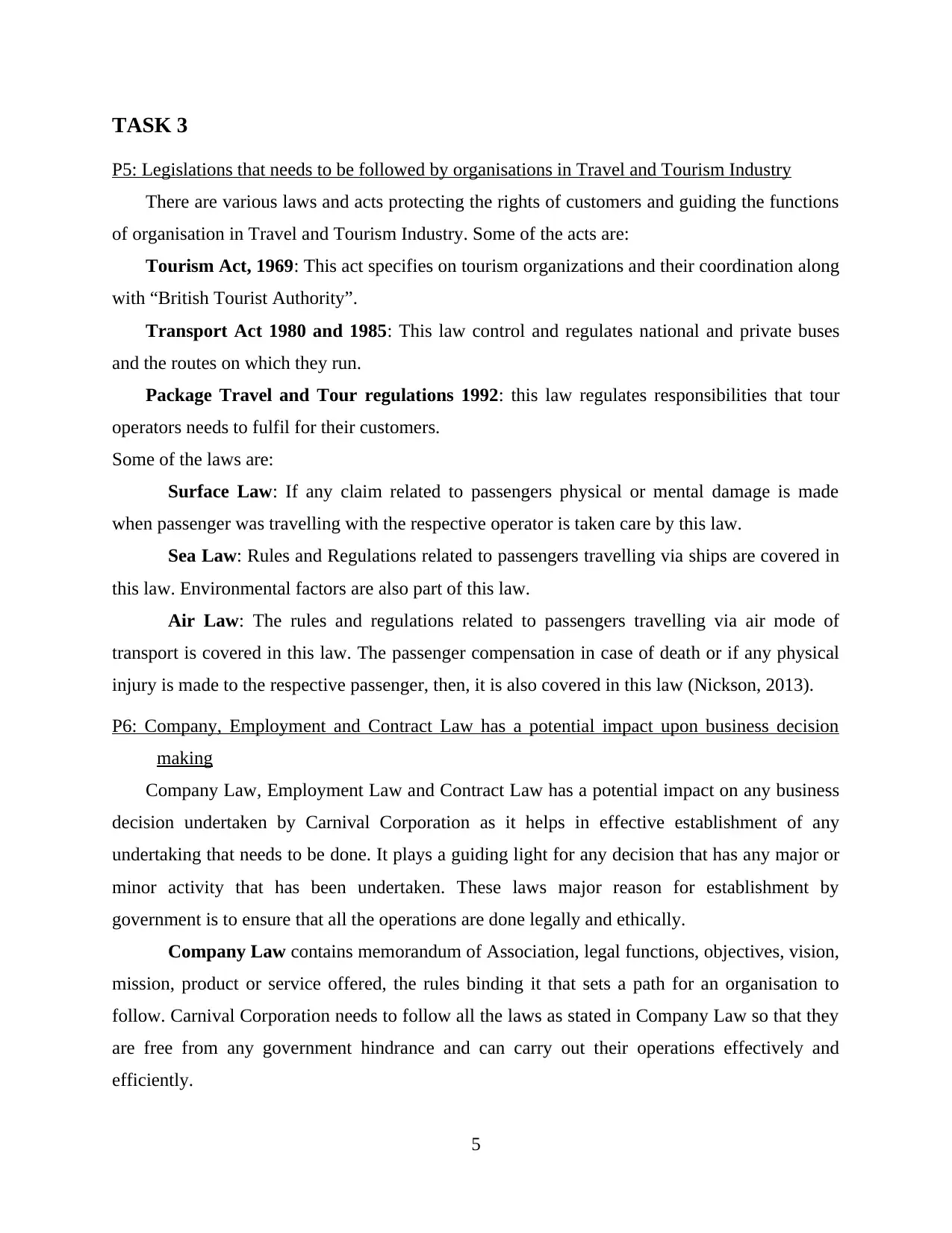
TASK 3
P5: Legislations that needs to be followed by organisations in Travel and Tourism Industry
There are various laws and acts protecting the rights of customers and guiding the functions
of organisation in Travel and Tourism Industry. Some of the acts are:
Tourism Act, 1969: This act specifies on tourism organizations and their coordination along
with “British Tourist Authority”.
Transport Act 1980 and 1985: This law control and regulates national and private buses
and the routes on which they run.
Package Travel and Tour regulations 1992: this law regulates responsibilities that tour
operators needs to fulfil for their customers.
Some of the laws are:
Surface Law: If any claim related to passengers physical or mental damage is made
when passenger was travelling with the respective operator is taken care by this law.
Sea Law: Rules and Regulations related to passengers travelling via ships are covered in
this law. Environmental factors are also part of this law.
Air Law: The rules and regulations related to passengers travelling via air mode of
transport is covered in this law. The passenger compensation in case of death or if any physical
injury is made to the respective passenger, then, it is also covered in this law (Nickson, 2013).
P6: Company, Employment and Contract Law has a potential impact upon business decision
making
Company Law, Employment Law and Contract Law has a potential impact on any business
decision undertaken by Carnival Corporation as it helps in effective establishment of any
undertaking that needs to be done. It plays a guiding light for any decision that has any major or
minor activity that has been undertaken. These laws major reason for establishment by
government is to ensure that all the operations are done legally and ethically.
Company Law contains memorandum of Association, legal functions, objectives, vision,
mission, product or service offered, the rules binding it that sets a path for an organisation to
follow. Carnival Corporation needs to follow all the laws as stated in Company Law so that they
are free from any government hindrance and can carry out their operations effectively and
efficiently.
5
P5: Legislations that needs to be followed by organisations in Travel and Tourism Industry
There are various laws and acts protecting the rights of customers and guiding the functions
of organisation in Travel and Tourism Industry. Some of the acts are:
Tourism Act, 1969: This act specifies on tourism organizations and their coordination along
with “British Tourist Authority”.
Transport Act 1980 and 1985: This law control and regulates national and private buses
and the routes on which they run.
Package Travel and Tour regulations 1992: this law regulates responsibilities that tour
operators needs to fulfil for their customers.
Some of the laws are:
Surface Law: If any claim related to passengers physical or mental damage is made
when passenger was travelling with the respective operator is taken care by this law.
Sea Law: Rules and Regulations related to passengers travelling via ships are covered in
this law. Environmental factors are also part of this law.
Air Law: The rules and regulations related to passengers travelling via air mode of
transport is covered in this law. The passenger compensation in case of death or if any physical
injury is made to the respective passenger, then, it is also covered in this law (Nickson, 2013).
P6: Company, Employment and Contract Law has a potential impact upon business decision
making
Company Law, Employment Law and Contract Law has a potential impact on any business
decision undertaken by Carnival Corporation as it helps in effective establishment of any
undertaking that needs to be done. It plays a guiding light for any decision that has any major or
minor activity that has been undertaken. These laws major reason for establishment by
government is to ensure that all the operations are done legally and ethically.
Company Law contains memorandum of Association, legal functions, objectives, vision,
mission, product or service offered, the rules binding it that sets a path for an organisation to
follow. Carnival Corporation needs to follow all the laws as stated in Company Law so that they
are free from any government hindrance and can carry out their operations effectively and
efficiently.
5
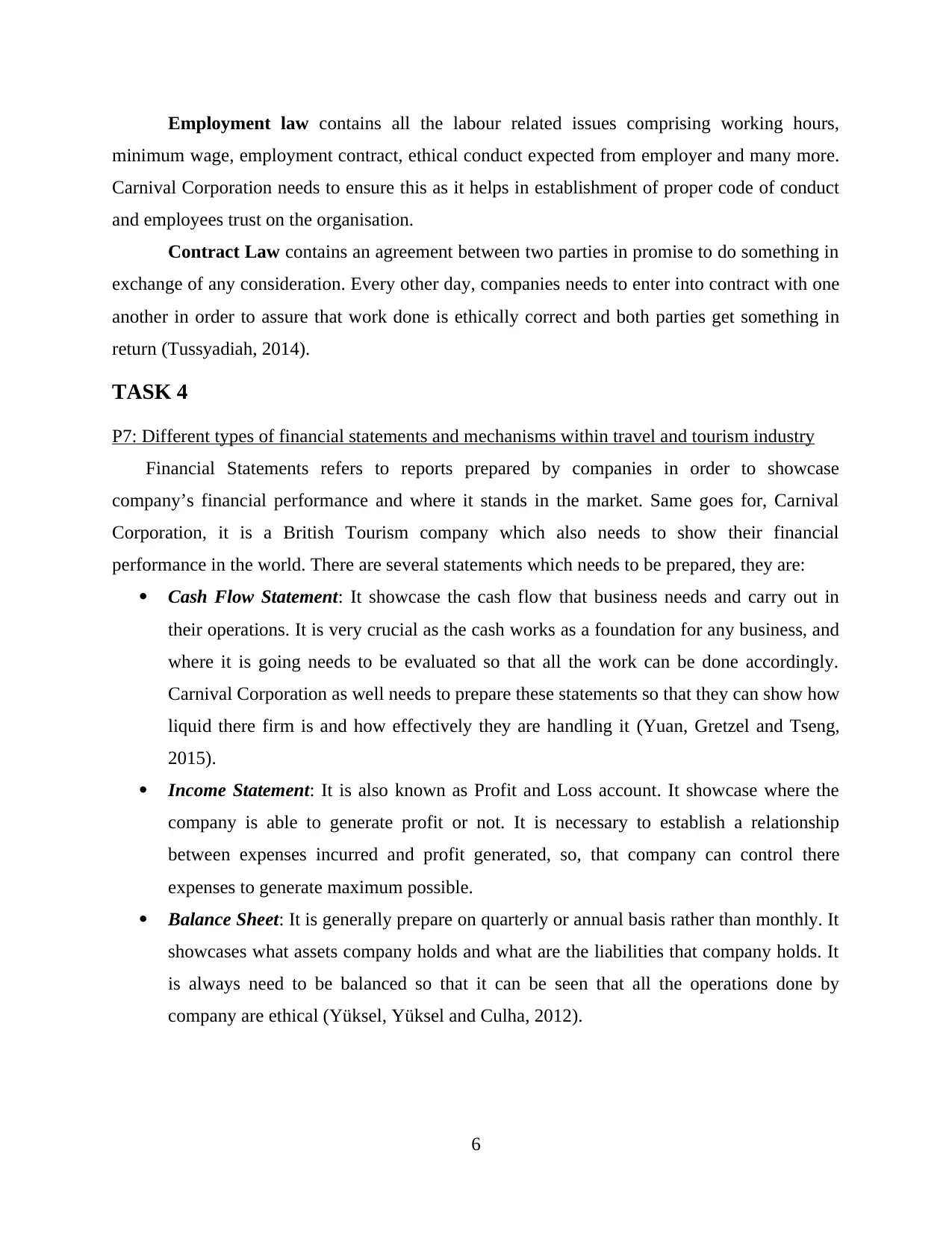
Employment law contains all the labour related issues comprising working hours,
minimum wage, employment contract, ethical conduct expected from employer and many more.
Carnival Corporation needs to ensure this as it helps in establishment of proper code of conduct
and employees trust on the organisation.
Contract Law contains an agreement between two parties in promise to do something in
exchange of any consideration. Every other day, companies needs to enter into contract with one
another in order to assure that work done is ethically correct and both parties get something in
return (Tussyadiah, 2014).
TASK 4
P7: Different types of financial statements and mechanisms within travel and tourism industry
Financial Statements refers to reports prepared by companies in order to showcase
company’s financial performance and where it stands in the market. Same goes for, Carnival
Corporation, it is a British Tourism company which also needs to show their financial
performance in the world. There are several statements which needs to be prepared, they are:
Cash Flow Statement: It showcase the cash flow that business needs and carry out in
their operations. It is very crucial as the cash works as a foundation for any business, and
where it is going needs to be evaluated so that all the work can be done accordingly.
Carnival Corporation as well needs to prepare these statements so that they can show how
liquid there firm is and how effectively they are handling it (Yuan, Gretzel and Tseng,
2015).
Income Statement: It is also known as Profit and Loss account. It showcase where the
company is able to generate profit or not. It is necessary to establish a relationship
between expenses incurred and profit generated, so, that company can control there
expenses to generate maximum possible.
Balance Sheet: It is generally prepare on quarterly or annual basis rather than monthly. It
showcases what assets company holds and what are the liabilities that company holds. It
is always need to be balanced so that it can be seen that all the operations done by
company are ethical (Yüksel, Yüksel and Culha, 2012).
6
minimum wage, employment contract, ethical conduct expected from employer and many more.
Carnival Corporation needs to ensure this as it helps in establishment of proper code of conduct
and employees trust on the organisation.
Contract Law contains an agreement between two parties in promise to do something in
exchange of any consideration. Every other day, companies needs to enter into contract with one
another in order to assure that work done is ethically correct and both parties get something in
return (Tussyadiah, 2014).
TASK 4
P7: Different types of financial statements and mechanisms within travel and tourism industry
Financial Statements refers to reports prepared by companies in order to showcase
company’s financial performance and where it stands in the market. Same goes for, Carnival
Corporation, it is a British Tourism company which also needs to show their financial
performance in the world. There are several statements which needs to be prepared, they are:
Cash Flow Statement: It showcase the cash flow that business needs and carry out in
their operations. It is very crucial as the cash works as a foundation for any business, and
where it is going needs to be evaluated so that all the work can be done accordingly.
Carnival Corporation as well needs to prepare these statements so that they can show how
liquid there firm is and how effectively they are handling it (Yuan, Gretzel and Tseng,
2015).
Income Statement: It is also known as Profit and Loss account. It showcase where the
company is able to generate profit or not. It is necessary to establish a relationship
between expenses incurred and profit generated, so, that company can control there
expenses to generate maximum possible.
Balance Sheet: It is generally prepare on quarterly or annual basis rather than monthly. It
showcases what assets company holds and what are the liabilities that company holds. It
is always need to be balanced so that it can be seen that all the operations done by
company are ethical (Yüksel, Yüksel and Culha, 2012).
6
⊘ This is a preview!⊘
Do you want full access?
Subscribe today to unlock all pages.

Trusted by 1+ million students worldwide
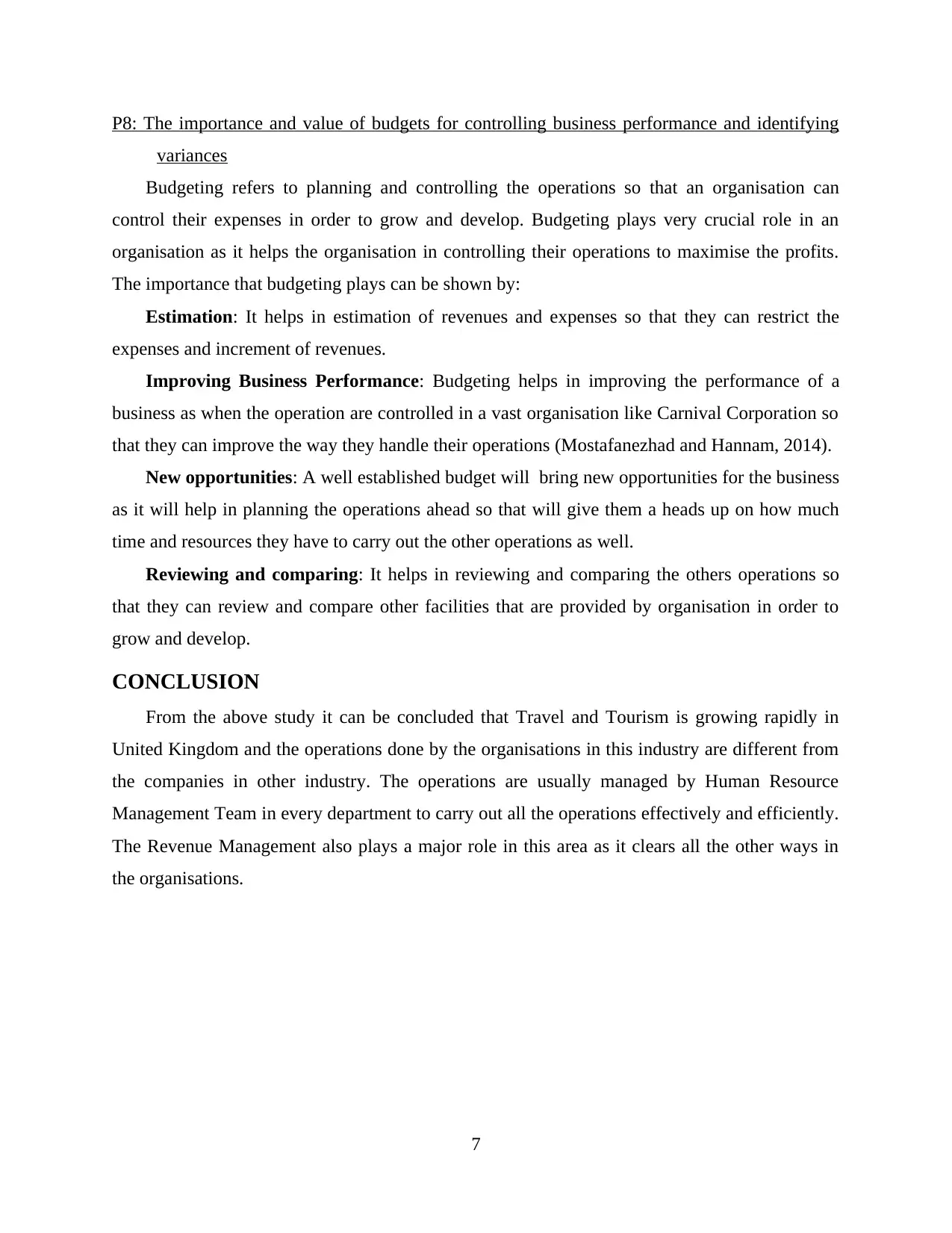
P8: The importance and value of budgets for controlling business performance and identifying
variances
Budgeting refers to planning and controlling the operations so that an organisation can
control their expenses in order to grow and develop. Budgeting plays very crucial role in an
organisation as it helps the organisation in controlling their operations to maximise the profits.
The importance that budgeting plays can be shown by:
Estimation: It helps in estimation of revenues and expenses so that they can restrict the
expenses and increment of revenues.
Improving Business Performance: Budgeting helps in improving the performance of a
business as when the operation are controlled in a vast organisation like Carnival Corporation so
that they can improve the way they handle their operations (Mostafanezhad and Hannam, 2014).
New opportunities: A well established budget will bring new opportunities for the business
as it will help in planning the operations ahead so that will give them a heads up on how much
time and resources they have to carry out the other operations as well.
Reviewing and comparing: It helps in reviewing and comparing the others operations so
that they can review and compare other facilities that are provided by organisation in order to
grow and develop.
CONCLUSION
From the above study it can be concluded that Travel and Tourism is growing rapidly in
United Kingdom and the operations done by the organisations in this industry are different from
the companies in other industry. The operations are usually managed by Human Resource
Management Team in every department to carry out all the operations effectively and efficiently.
The Revenue Management also plays a major role in this area as it clears all the other ways in
the organisations.
7
variances
Budgeting refers to planning and controlling the operations so that an organisation can
control their expenses in order to grow and develop. Budgeting plays very crucial role in an
organisation as it helps the organisation in controlling their operations to maximise the profits.
The importance that budgeting plays can be shown by:
Estimation: It helps in estimation of revenues and expenses so that they can restrict the
expenses and increment of revenues.
Improving Business Performance: Budgeting helps in improving the performance of a
business as when the operation are controlled in a vast organisation like Carnival Corporation so
that they can improve the way they handle their operations (Mostafanezhad and Hannam, 2014).
New opportunities: A well established budget will bring new opportunities for the business
as it will help in planning the operations ahead so that will give them a heads up on how much
time and resources they have to carry out the other operations as well.
Reviewing and comparing: It helps in reviewing and comparing the others operations so
that they can review and compare other facilities that are provided by organisation in order to
grow and develop.
CONCLUSION
From the above study it can be concluded that Travel and Tourism is growing rapidly in
United Kingdom and the operations done by the organisations in this industry are different from
the companies in other industry. The operations are usually managed by Human Resource
Management Team in every department to carry out all the operations effectively and efficiently.
The Revenue Management also plays a major role in this area as it clears all the other ways in
the organisations.
7
Paraphrase This Document
Need a fresh take? Get an instant paraphrase of this document with our AI Paraphraser

8
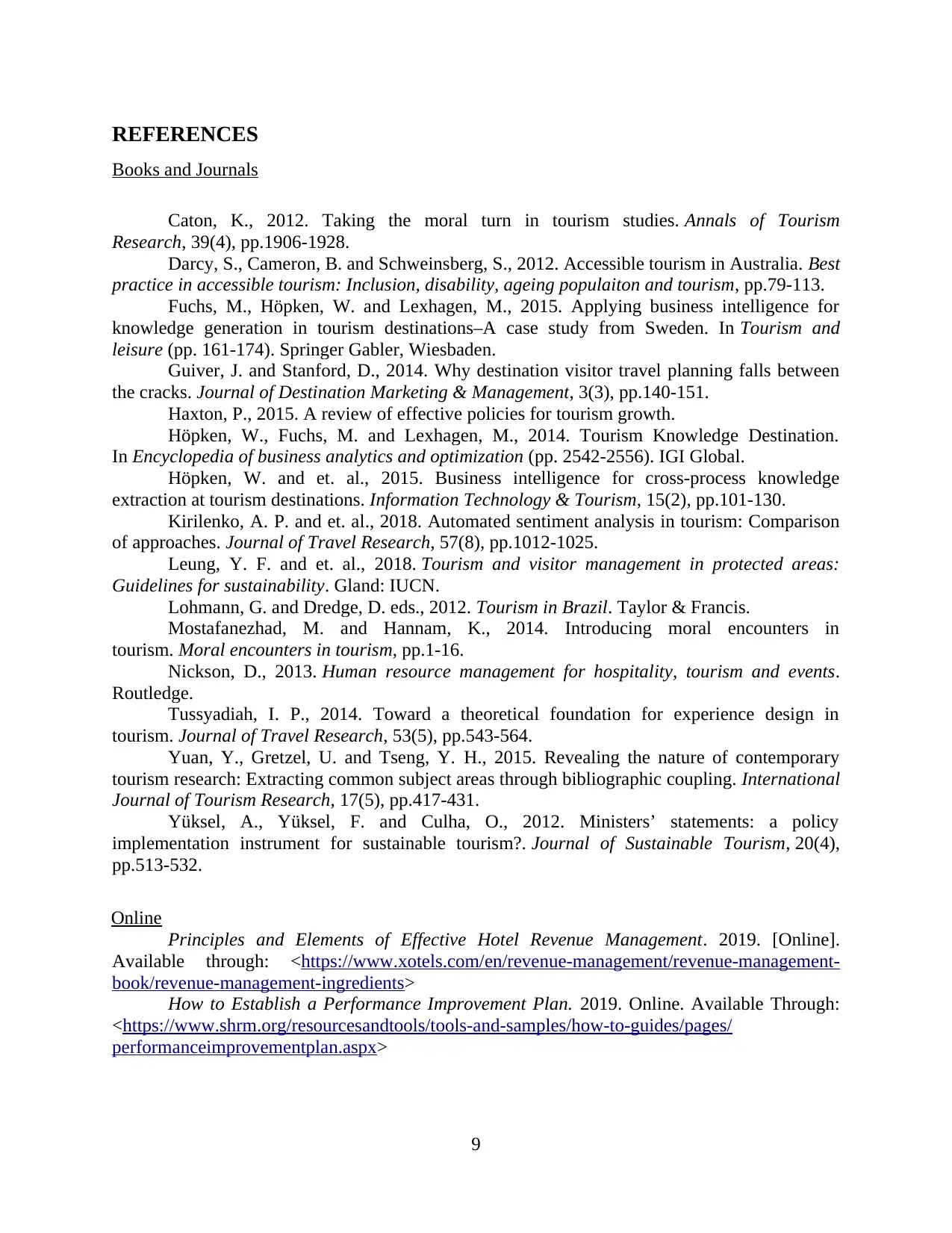
REFERENCES
Books and Journals
Caton, K., 2012. Taking the moral turn in tourism studies. Annals of Tourism
Research, 39(4), pp.1906-1928.
Darcy, S., Cameron, B. and Schweinsberg, S., 2012. Accessible tourism in Australia. Best
practice in accessible tourism: Inclusion, disability, ageing populaiton and tourism, pp.79-113.
Fuchs, M., Höpken, W. and Lexhagen, M., 2015. Applying business intelligence for
knowledge generation in tourism destinations–A case study from Sweden. In Tourism and
leisure (pp. 161-174). Springer Gabler, Wiesbaden.
Guiver, J. and Stanford, D., 2014. Why destination visitor travel planning falls between
the cracks. Journal of Destination Marketing & Management, 3(3), pp.140-151.
Haxton, P., 2015. A review of effective policies for tourism growth.
Höpken, W., Fuchs, M. and Lexhagen, M., 2014. Tourism Knowledge Destination.
In Encyclopedia of business analytics and optimization (pp. 2542-2556). IGI Global.
Höpken, W. and et. al., 2015. Business intelligence for cross-process knowledge
extraction at tourism destinations. Information Technology & Tourism, 15(2), pp.101-130.
Kirilenko, A. P. and et. al., 2018. Automated sentiment analysis in tourism: Comparison
of approaches. Journal of Travel Research, 57(8), pp.1012-1025.
Leung, Y. F. and et. al., 2018. Tourism and visitor management in protected areas:
Guidelines for sustainability. Gland: IUCN.
Lohmann, G. and Dredge, D. eds., 2012. Tourism in Brazil. Taylor & Francis.
Mostafanezhad, M. and Hannam, K., 2014. Introducing moral encounters in
tourism. Moral encounters in tourism, pp.1-16.
Nickson, D., 2013. Human resource management for hospitality, tourism and events.
Routledge.
Tussyadiah, I. P., 2014. Toward a theoretical foundation for experience design in
tourism. Journal of Travel Research, 53(5), pp.543-564.
Yuan, Y., Gretzel, U. and Tseng, Y. H., 2015. Revealing the nature of contemporary
tourism research: Extracting common subject areas through bibliographic coupling. International
Journal of Tourism Research, 17(5), pp.417-431.
Yüksel, A., Yüksel, F. and Culha, O., 2012. Ministers’ statements: a policy
implementation instrument for sustainable tourism?. Journal of Sustainable Tourism, 20(4),
pp.513-532.
Online
Principles and Elements of Effective Hotel Revenue Management. 2019. [Online].
Available through: <https://www.xotels.com/en/revenue-management/revenue-management-
book/revenue-management-ingredients>
How to Establish a Performance Improvement Plan. 2019. Online. Available Through:
<https://www.shrm.org/resourcesandtools/tools-and-samples/how-to-guides/pages/
performanceimprovementplan.aspx>
9
Books and Journals
Caton, K., 2012. Taking the moral turn in tourism studies. Annals of Tourism
Research, 39(4), pp.1906-1928.
Darcy, S., Cameron, B. and Schweinsberg, S., 2012. Accessible tourism in Australia. Best
practice in accessible tourism: Inclusion, disability, ageing populaiton and tourism, pp.79-113.
Fuchs, M., Höpken, W. and Lexhagen, M., 2015. Applying business intelligence for
knowledge generation in tourism destinations–A case study from Sweden. In Tourism and
leisure (pp. 161-174). Springer Gabler, Wiesbaden.
Guiver, J. and Stanford, D., 2014. Why destination visitor travel planning falls between
the cracks. Journal of Destination Marketing & Management, 3(3), pp.140-151.
Haxton, P., 2015. A review of effective policies for tourism growth.
Höpken, W., Fuchs, M. and Lexhagen, M., 2014. Tourism Knowledge Destination.
In Encyclopedia of business analytics and optimization (pp. 2542-2556). IGI Global.
Höpken, W. and et. al., 2015. Business intelligence for cross-process knowledge
extraction at tourism destinations. Information Technology & Tourism, 15(2), pp.101-130.
Kirilenko, A. P. and et. al., 2018. Automated sentiment analysis in tourism: Comparison
of approaches. Journal of Travel Research, 57(8), pp.1012-1025.
Leung, Y. F. and et. al., 2018. Tourism and visitor management in protected areas:
Guidelines for sustainability. Gland: IUCN.
Lohmann, G. and Dredge, D. eds., 2012. Tourism in Brazil. Taylor & Francis.
Mostafanezhad, M. and Hannam, K., 2014. Introducing moral encounters in
tourism. Moral encounters in tourism, pp.1-16.
Nickson, D., 2013. Human resource management for hospitality, tourism and events.
Routledge.
Tussyadiah, I. P., 2014. Toward a theoretical foundation for experience design in
tourism. Journal of Travel Research, 53(5), pp.543-564.
Yuan, Y., Gretzel, U. and Tseng, Y. H., 2015. Revealing the nature of contemporary
tourism research: Extracting common subject areas through bibliographic coupling. International
Journal of Tourism Research, 17(5), pp.417-431.
Yüksel, A., Yüksel, F. and Culha, O., 2012. Ministers’ statements: a policy
implementation instrument for sustainable tourism?. Journal of Sustainable Tourism, 20(4),
pp.513-532.
Online
Principles and Elements of Effective Hotel Revenue Management. 2019. [Online].
Available through: <https://www.xotels.com/en/revenue-management/revenue-management-
book/revenue-management-ingredients>
How to Establish a Performance Improvement Plan. 2019. Online. Available Through:
<https://www.shrm.org/resourcesandtools/tools-and-samples/how-to-guides/pages/
performanceimprovementplan.aspx>
9
⊘ This is a preview!⊘
Do you want full access?
Subscribe today to unlock all pages.

Trusted by 1+ million students worldwide
1 out of 12
Related Documents
Your All-in-One AI-Powered Toolkit for Academic Success.
+13062052269
info@desklib.com
Available 24*7 on WhatsApp / Email
![[object Object]](/_next/static/media/star-bottom.7253800d.svg)
Unlock your academic potential
Copyright © 2020–2026 A2Z Services. All Rights Reserved. Developed and managed by ZUCOL.





